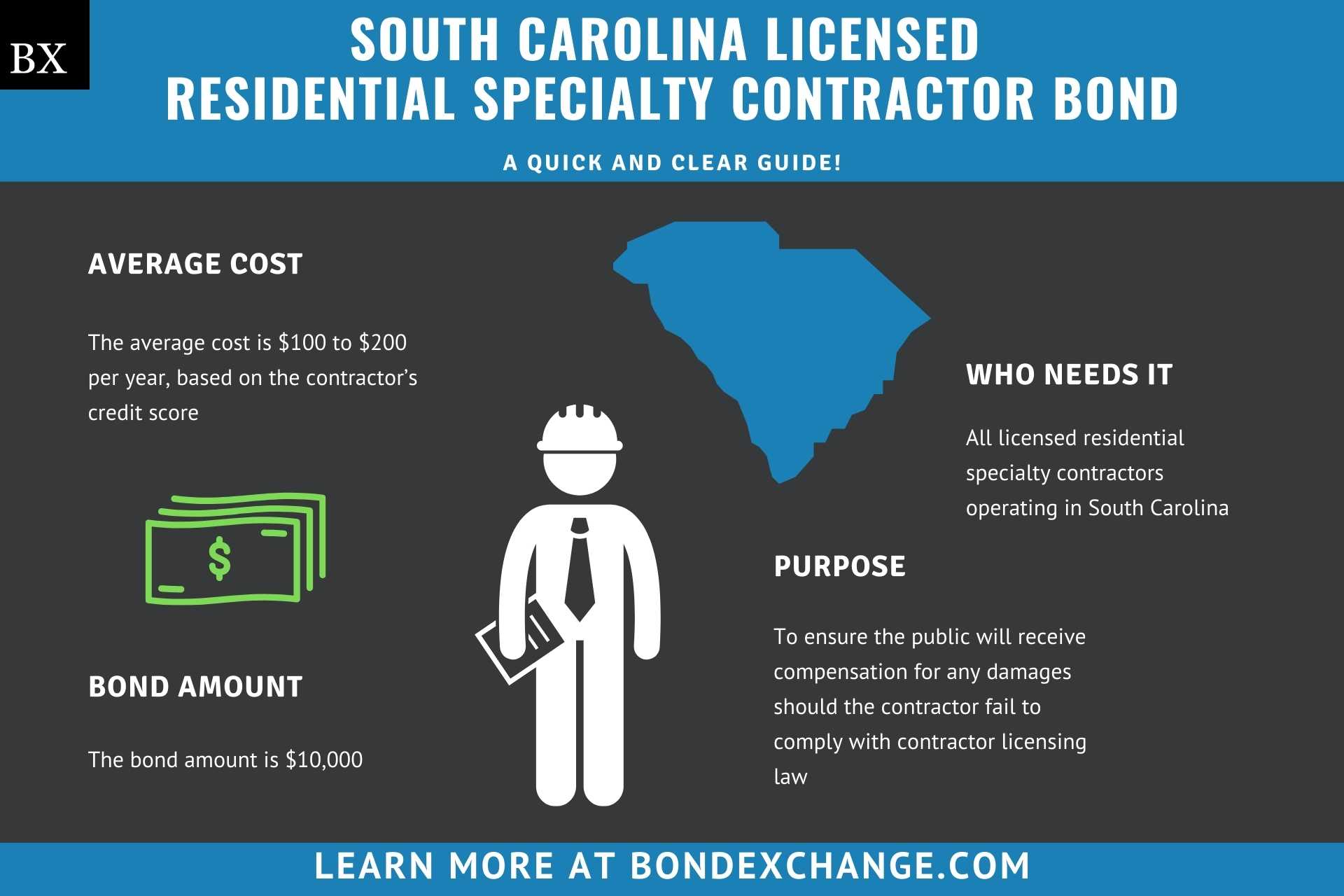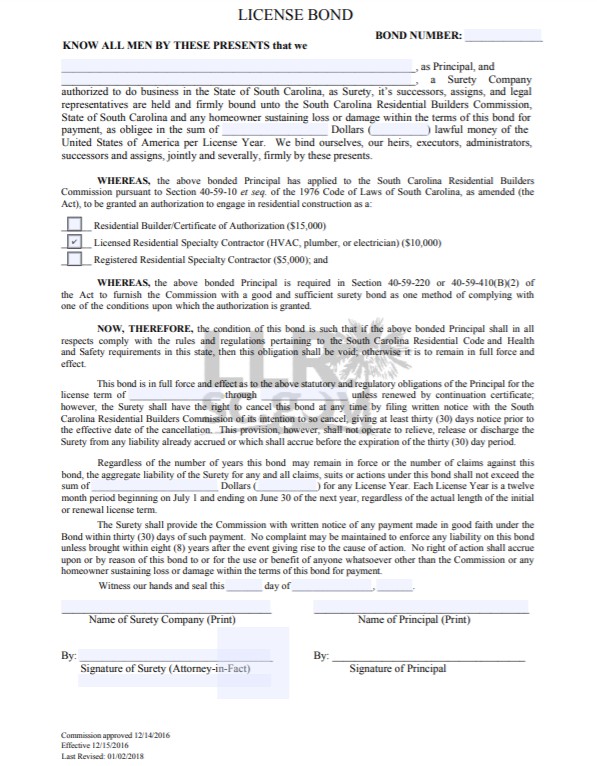South Carolina Licensed Residential Specialty Contractor Bond: A Comprehensive Guide
January 6th, 2021

This guide provides information for insurance agents to help contractors on South Carolina Licensed Residential Specialty Contractor bonds
*This page focuses solely on the bond requirements for licensed residential specialty contractors. Insurance agents can learn about the bond requirements for registered residential specialty contractors here
At a Glance:
- Average Cost: $100 to $200 per year, based on the contractor’s credit score
- Bond Amount: $10,000
- Who Needs It: All licensed residential specialty contractors operating in South Carolina
- Purpose: To ensure the public will receive compensation for any damages should the contractor fail to comply with contractor licensing law
- Who Regulates Residential Specialty Contractors in South Carolina: The South Carolina Residential Builders Commission (RBC)
Background
South Carolina Code of Laws 40-59-30 requires residential specialty contractors operating in the state to obtain either a license or registration with the RBC. The South Carolina legislature enacted licensing laws and regulations to ensure that contractors engage in ethical business practices. In order to provide financial security for the enforcement of the license law, contractors must purchase and maintain a $10,000 licensed residential specialty contractor surety bond to be eligible for licensure.
What is the Purpose of the South Carolina Licensed Residential Specialty Contractor Bond?
South Carolina requires contractors to purchase the Licensed Residential Specialty Contractor Bond as part of the application process for the Residential Specialty Contractor License. The bond ensures that the public will receive compensation for financial harm if the contractor fails to comply with the licensing regulations. In short, the bond is a type of insurance that protects the public if the contractor breaks licensing laws.

How Can an Insurance Agent Obtain a South Carolina Licensed Residential Specialty Contractor Surety Bond?
BondExchange makes obtaining a South Carolina Licensed Residential Specialty Contractor Bond easy. Simply login to your account and use our keyword search to find the “contractor” bond in our database. Don’t have a login? Enroll now and let us help you satisfy your customers’ needs. Our friendly underwriting staff is available by phone (800) 438-1162, email or chat from 7:30 AM to 7:00 PM EST to assist you.
At BondExchange, our 40 years of experience, leading technology, and access to markets ensures that we have the knowledge and resources to provide your clients with fast and friendly service whether obtaining quotes or issuing bonds.
Is a Credit Check Required for the South Carolina Licensed Residential Specialty Contractor Bond?
Surety companies will run a credit check on the owners of the contractor company to determine eligibility and pricing for the South Carolina Licensed Residential Specialty Contractor bond. Contractors with excellent credit and work experience can expect to receive the best rates. Contractors with poor credit may be declined by some surety companies or pay higher rates. The credit check is a “soft hit”, meaning that the credit check will not affect the contractors credit.
How Much Does the South Carolina Licensed Residential Specialty Contractor Bond Cost?
The South Carolina Licensed Residential Specialty Contractor surety bond can cost anywhere between $100 to $200 per year. Insurance companies determine the rate based on a number of factors including your customer’s credit score and experience. The chart below offers a quick reference for the approximate bond cost on the $10,000 bond requirement.
| Credit Score | Bond Cost (1 year) |
|---|---|
| 650+ | $100 |
| 625 – 649 | $150 |
| Lower than 625 | $200 |
*The credit score ranges do not include other factors that may result in a change to the annual premium offered to your customers, including but not limited to, years of experience and underlying credit factors contained within the business owner’s credit report.
How Does South Carolina Define “Residential Specialty Contractor”?
To paraphrase South Carolina Code of Laws 40-59-20, a residential specialty contractor is any individual or business entity who performs contract work requiring special skills such as plumbing, HVAC, or electrical services.
How Do Residential Specialty Contractors Apply for a License in South Carolina?
Contractors in South Carolina must navigate several steps to secure their residential specialty contractors license. Below are the general guidelines, but contractors should refer to the RBC’s licensing page for details on the process.
License Period – All South Carolina Residential Specialty Contractor Licenses expire on June 30 of every odd numbered year (2021, 2023 etc) and must be renewed before the expiration date
Step 1 – Determine the License Type
South Carolina requires contractors to obtain specific licenses corresponding to the nature of work that the contractor’s business performs. Below are the different types of the South Carolina Residential Specialty Contractors License.
-
- Electrical – Performs electrical contract work
- Heating and Air Conditioning – Performs contract work specializing in heating and air conditioning
- Plumbing – Performs plumbing related contract work
Step 2 – Meet the Experience Qualifications
All residential specialty contractors will need at least one year of relevant work experience to be eligible for licensure. Contractors will need to submit supporting documentation with their application verifying their experience (W2s or 109s). Contractors will need to list a licensed supervisor on their application who will be mailed an affidavit once the contractor has submitted their license application. The supervisor must fill out and return the affidavit prior to the contractor receiving their license.
Step 3 – Complete the Application
Contractors can complete their application online here
Step 4 – Pay the Application Fee
All contractors must submit a $100 application fee with their license application
Step 5 – Pass the Exam
After submitting the license application, contractors will be mailed an exam waiver authorizing them to take the required licensing exam. Contractors can register for their licensure examination here.
Step 6 – Pay the Licensing Fee
After passing the exam, contractors will need to pay a licensing fee in the following amount:
-
- $160 if the license is issued between July 1 of an odd-numbered year to June 30 of an even-numbered year
- $80 if the license is issued between July 1 of an even-numbered year to June 30 of an odd-numbered year
Step 7 – Purchase a Surety Bond
Residential specialty contractors who performs jobs with a total project cost of $5,000 or more will need to purchase and maintain a $10,000 licensed residential specialty contractor surety bond
How Do South Carolina Residential Specialty Contractors Renew Their License?
Residential specialty contractors can renew their license online here. All South Carolina Residential Specialty Contractor Licenses expire on June 30 of every odd numbered year (2021, 2023 etc) and must be renewed before the expiration date
What Are the Insurance Requirements for the South Carolina Residential Specialty Contractor License?
The State of South Carolina does not require residential specialty contractors to obtain any form of liability insurance. Contractors who work on projects costing $5,000 or more will need to purchase and maintain a $10,000 licensed residential specialty contractor surety bond.
How Do South Carolina Residential Specialty Contractors File Their Bond With The RBC?
Contractors should mail the completed bond form, including the power of attorney, to the following address:
South Carolina Department of Labor, Licensing and Regulation
Residential Builders Commission
PO Box 11329
Columbia, South Carolina 29211
The licensed residential specialty contractor surety bond requires signatures from both the surety company that issues the bond and the contractor. The surety company should include the following information on the bond form:
- Legal name of entity/individual(s) buying the bond
- Surety company’s name
- Bond amount
- Contractor’s license term
- Date the bond is signed and goes into effect
What Can Contractors Do to Avoid Claims Against the South Carolina Licensed Residential Specialty Contractor Bond?
To avoid claims on the Licensed Residential Specialty Contractor Bond, contractors must follow all license regulations in the state, including some of the most important issues below that tend to cause claims:
- Do not be negligent when performing contract work
- Do not abandon a job without a proper reason
- Do not engage in any acts of fraud
- Do not falsely advertise or misrepresent your abilities
- Do not engage in contract work outside the scope of your license
What Other Insurance Products Can Agents Offer Residential Specialty Contractors in South Carolina?
South Carolina does not require residential specialty contractors to obtain any form of liability insurance. However, most contractors will seek to obtain this insurance anyway. Bonds are our only business at BondExchange, so we do not issue liability insurance, but our agents often utilize brokers for this specific line of business. A list of brokers in this space can be found here.
How Can Insurance Agents Prospect for South Carolina Licensed Residential Specialty Contractor Customers?
South Carolina conveniently provides a public database to search for active licensed residential specialty contractors in the state. The database can be accessed here. Contact BondExchange for additional marketing resources. Agents can also leverage our print-mail relationships for discounted mailing services.
What other Contractor License Bonds are Required in South Carolina?
Contractors in South Carolina will need to obtain specific bonds correlating with their license type. Below are all the different contractor licensing bonds required by South Carolina:
- General and Mechanical Contractor License – Bond limit varies
- Registered Residential Specialty Contractor – $5,000 bond limit
- Residential Builder / Certificate of Authority – $15,000 bond limit

